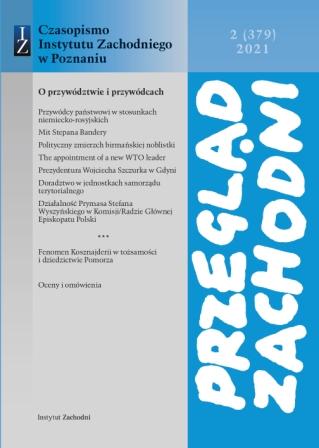Stosunki niemiecko-rosyjskie po zimnej wojnie na poziomie przywódców państwowych. Pod znakiem personalizacji i depersonalizacji
German-Russian relations after the Cold War in the aspect of state leaders. Under the mark of personalization and depersonalization
Author(s): Michał M. KosmanSubject(s): Diplomatic history, Political history, International relations/trade, Cold-War History, Geopolitics, Peace and Conflict Studies
Published by: Instytut Zachodni im. Zygmunta Wojciechowskiego
Keywords: state leaders; Germany; Russia; Helmut Kohl; Gerhard Schröder; Angela Merkel; Boris Yeltsin; Vladimir Putin; Dmitry Medvedev;
Summary/Abstract: The article examines the issue of German-Russian relations at the level of state leaders after the end of the Cold War. These bilateral contacts involved different phases. The first phase was dominated by personalization, which was characterized by friendly relations between Helmut Kohl and Boris Yeltsin. After Gerhard Schröder took the office of chancellor, a short phase of depersonalization in the relations between Schröder and Yeltsin followed. After Vladimir Putin took power in Russia, the personalization phase returned, manifested by friendly contacts between Schröder and Putin, which ended when Angela Merkel assumed the office of chancellor. Her relations with Putin and Medvedev were of a pragmatic nature, aimed at solving current problems in international relations. The article describes the above-mentioned relations between the leaders and their influence on bilateral relations between the two states.
Journal: Przegląd Zachodni
- Issue Year: 379/2021
- Issue No: 02
- Page Range: 7-23
- Page Count: 17
- Language: Polish

